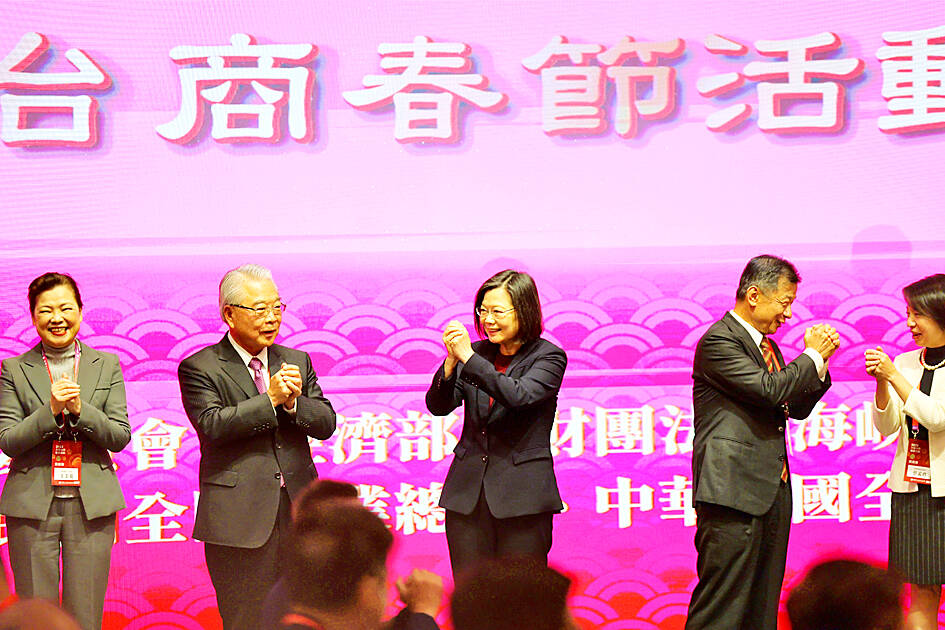Taiwan is willing to negotiate with China about reducing border restrictions in a mutually respectful dialogue, President Tsai Ing-wen (蔡英文) said yesterday.
Tsai made the remark at a Straits Exchange Foundation Lunar New Year event for Taiwanese entrepreneurs conducting business in China.
Bilateral interactions should resume as the COVID-19 pandemic eases, so long as safeguards for public health are in place, she said.

Photo: CNA
Beijing has requested Taiwan’s cooperation in reopening 16 points of entry for air travel across the Strait, China’s Taiwan Affairs Office said on Wednesday, adding that travel between the two sides should return to its pre-pandemic status.
Tsai said that Taipei and Beijing are equally responsible for good cross-strait relations, and that she is always open to respectful dialogue.
Taiwan is considering Beijing’s proposal, but needs the Chinese government to provide accurate data about the spread of COVID-19 in China, Mainland Affairs Council (MAC) Minister Chiu Tai-san (邱太三) told reporters on the sidelines of the foundation’s event.
Taiwan would like to work with China on the matter, and government agencies are evaluating whether the conditions permit a resumption of normal air travel, Chiu said.
Transparency about the spread of the virus in China would make Taipei more amenable to Beijing’s proposal, he added.
Fluctuations in the severity of China’s COVID-19 outbreak and the difficulties involved in navigating pandemic restrictions imposed by local Chinese governments have made Taiwanese airlines hesitant to schedule flights to a number of cities in China, he said.
China’s sudden cancelation of more than 70 percent of flights bound for Guangzhou in October last year is one example Chiu cited as a major inconvenience experienced by airlines and travelers.
Ten Taiwanese and 51 Chinese points of entry were being utilized before the pandemic, and only four are open at present, he said.
The MAC is working toward maintaining the so-called “small three links” which have enabled some Taiwanese and Chinese to travel through ports on a few of Taiwan’s outlying islands, Chiu said.
The links via Kimen and Lienchiang counties remained open through the Lunar New Year by means of a special dispensation the legislature passed on Dec. 22 last year, but is set to expire on Feb 20.
The MAC’s goal is to extend the special act, which more than 2,600 travelers have utilized since the reopening, Chiu said.
The percentage of travelers who have been confirmed to have COVID-19 has dropped steadily from 19 percent on the first day of the program to 2 percent at present, which is an encouraging sign for safe travel across the Strait, he said.
The MAC is to confer with the Ministry of Transportation and Communications, the Ministry of Health and Welfare and the Central Epidemic Command Center before making a decision, he said.

CHAOS: Iranians took to the streets playing celebratory music after reports of Khamenei’s death on Saturday, while mourners also gathered in Tehran yesterday Iranian Supreme Leader Ayatollah Ali Khamenei was killed in a major attack on Iran launched by Israel and the US, throwing the future of the Islamic republic into doubt and raising the risk of regional instability. Iranian state television and the state-run IRNA news agency announced the 86-year-old’s death early yesterday. US President Donald Trump said it gave Iranians their “greatest chance” to “take back” their country. The announcements came after a joint US and Israeli aerial bombardment that targeted Iranian military and governmental sites. Trump said the “heavy and pinpoint bombing” would continue through the week or as long

TRUST: The KMT said it respected the US’ timing and considerations, and hoped it would continue to honor its commitments to helping Taiwan bolster its defenses and deterrence US President Donald Trump is delaying a multibillion-dollar arms sale to Taiwan to ensure his visit to Beijing is successful, a New York Times report said. The weapons sales package has stalled in the US Department of State, the report said, citing US officials it did not identify. The White House has told agencies not to push forward ahead of Trump’s meeting with Chinese President Xi Jinping (習近平), it said. The two last month held a phone call to discuss trade and geopolitical flashpoints ahead of the summit. Xi raised the Taiwan issue and urged the US to handle arms sales to

BIG SPENDERS: Foreign investors bought the most Taiwan equities since 2005, signaling confidence that an AI boom would continue to benefit chipmakers Taiwan Semiconductor Manufacturing Co’s (TSMC, 台積電) market capitalization swelled to US$2 trillion for the first time following a 4.25 percent rally in its American depositary receipts (ADR) overnight, putting the world’s biggest contract chipmaker sixth on the list of the world’s biggest companies by market capitalization, just behind Amazon.com Inc. The site CompaniesMarketcap.com ranked TSMC ahead of Saudi Aramco and Meta Platforms Inc. The Taiwanese company’s ADRs on Tuesday surged to US$385.75 on the New York Stock Exchange, as strong demand for artificial intelligence (AI) applications led to chip supply constraints and boost revenue growth to record-breaking levels. Each TSMC ADR represents

State-run CPC Corp, Taiwan (CPC, 台灣中油) yesterday said that it had confirmed on Saturday night with its liquefied natural gas (LNG) and crude oil suppliers that shipments are proceeding as scheduled and that domestic supplies remain unaffected. The CPC yesterday announced the gasoline and diesel prices will rise by NT$0.2 and NT$0.4 per liter, respectively, starting Monday, citing Middle East tensions and blizzards in the eastern United States. CPC also iterated it has been reducing the proportion of crude oil imports from the Middle East and diversifying its supply sources in the past few years in response to geopolitical risks, expanding